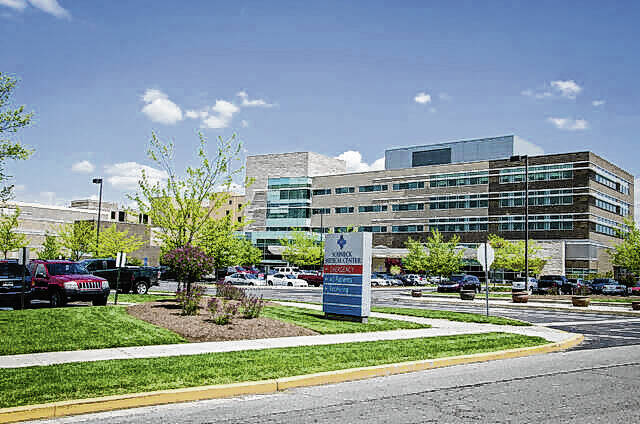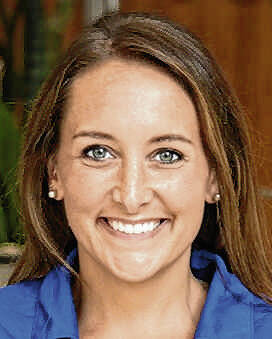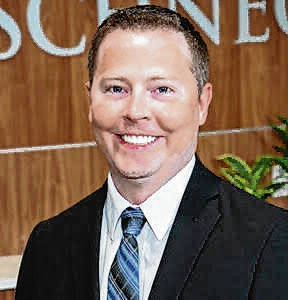The prevalence of respiratory illnesses — influenza A, respiratory syncytial virus and COVID-19 — is equal right now at Schneck Medical Center in Seymour.
Hospital officials say it’s common this time of year to see surges in these illnesses, and that can result is visitor restrictions.
Those go into effect Saturday to help protect patients, staff and the community from the spread of the illnesses, according to a news release from the hospital.
Natalie Wiethoff, an infection preventionist at Schneck, said when 10% of the tests coming through Schneck’s urgent care offices, emergency room and outpatient offices are positive for a respiratory illness or 10% of the hospital’s in-patient population is admitted with a respiratory illness, the visitor restrictions are implemented. She monitors the numbers on a daily basis.
“We’ve seen an increase in the number of patients with respiratory illness symptoms, prompting us to implement visitor restrictions,” Wiethoff said.
No more than two visitors may be admitted to a patient’s room at one time. Visitors include immediate family and significant others as identified by the patient.
Visitors with respiratory illnesses are not permitted to visit patients, and anyone with the following symptoms is asked to refrain from visiting patients: Fever and/or chills, sore throat, muscle aches, runny or stuffy nose, cough, fatigue, headache, vomiting and/or diarrhea.
“Those visitors should be healthy and not have any other signs or symptoms of being ill,” said Dr. Ryan Stone, chief medical officer for Schneck.
All visitors must wash their hands with soap and water or use alcohol-based hand sanitizer before and after visiting a patient. Hand sanitizer can be found throughout the hospital and outside each patient’s room.
Patients hospitalized because of a respiratory illness will have enhanced precautions, including mask wearing for their visitors and hospital staff.
Dr. Christopher Bunce, an infectious disease specialist at Schneck and Jackson County’s health officer, said anyone can get a respiratory illness, and anyone at any age can develop serious problems. Respiratory illnesses can be mild to severe and can lead to death.
“RSV is responsible for nationwide thousands of deaths a year, and most of those deaths occur in people who are elderly or people who are generally under the age of 18 months,” he said.
One way to prevent respiratory illnesses is getting vaccinated for the flu, COVID and/or RSV (if advised by your physician). Schneck said vaccines can reduce respiratory illnesses, doctor visits, missed work or school and related hospitalizations.
Bunce said in the fall, two RSV vaccines were approved for people 60 and older in consultation with their physician.
“It’s a recommendation that you discuss it with your doctor based on your own medical predisposition, so if you have respiratory illness or heart disease or diabetes, it’s a stronger consideration, and you may want to get it,” he said.
A vaccine also was approved for pregnant females for gestational age 32 to 36 weeks.
“That’s in order to boost the maternal antibody, which is transferred to the child and protects that child for the first six months of its life,” Bunce said.
He said a specific monoclonal antibody is recommended for newborns 8 months or younger at the time or born during the RSV season or upcoming RSV season, which is October to March.
The RSV vaccines are available at retail pharmacies and Schneck Primary Care offices, while flu and COVID-19 vaccines are available at those places along with some other doctor’s offices and the Jackson County Health Department.
Stone said a person can get all of the vaccines at the same time.
“You’re immune system is like a juggler who can juggle 12 balls at once. It doesn’t make any difference, you don’t confuse your immune system, overwork your immune system by getting multiple vaccinations at once,” Bunce said, confirming Stone’s statement.
“All of these viruses can be caught multiple times,” Bunce added. “Just because you’ve gotten it doesn’t mean you’re immune to it. The virus changes, especially the COVID and the influenza viruses.”
Other ways to prevent respiratory illnesses include avoiding close contact with others who are sick; if you are sick, staying home for at least 24 hours after your fever is gone; covering your nose and mouth when coughing or sneezing; washing your hands frequently; and avoiding touching your eyes, nose and mouth.
“Those are simple things you can do every day,” Wiethoff said. “If you are experiencing respiratory illness symptoms, please seek medical attention. If you are sick and are not getting better, contact your health care provider for further treatment.”
Bunce said respiratory illnesses are highly transmissible, and their transmissibility is completely dependent on close human contact.
“It’s real important that people understand that these precautions have a lot of evidence to back them up,” he said. “This isn’t voodoo. We know how these viruses are transmitted, and they are all transmitted really in the exact same way.”
Just because a person has a very mild version of one of these infections, Bunce said it doesn’t mean the next person isn’t going to be severely impacted, end up in the emergency room or hospital or even die.
“In learning about COVID, repeated infections are probably not good for you,” he said. “There’s more and more data that people who have had repeated infections, their long-term outcomes may be different and may be worse. We know about long COVID, we know other things, so just because you’ve had it doesn’t mean you should welcome the next infection.”




